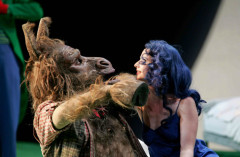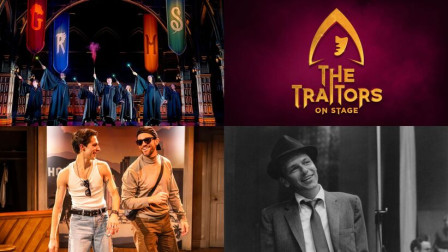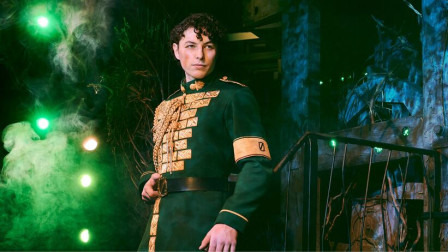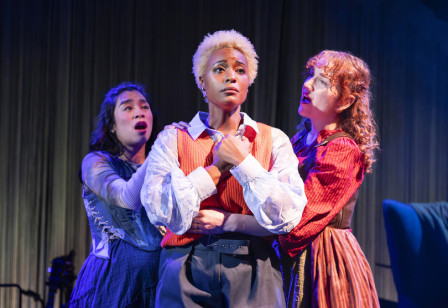Review: A MIDSUMMER NIGHT’S DREAM at English National Opera
 Benjamin Britten’s operatic version of the hardy Shakespeare perennial was commissioned for the re-opening, in 1960, of the Jubilee Hall in his home town of Alderburgh, in Suffolk.
Benjamin Britten’s operatic version of the hardy Shakespeare perennial was commissioned for the re-opening, in 1960, of the Jubilee Hall in his home town of Alderburgh, in Suffolk.
One of the principal reasons for choosing to work from an existing play seems to have been that Alderbugh council only belatedly got round to commissioning Britten, and there wasn’t time to wait for a librettist to come up with the goods. So Britten and his partner, Peter Pears, took a pair of shears to Shakespeare’s text, threw away half of it, and set to work on the rest. What remains is all Shakespeare and, happily, makes at least as much narrative and dramatic sense as the original. It’s is as pleasing, warming and English as a bowl of custard; a perfect refuge from the blizzard that was blowing outside on the night I visited.
Another consequence of the circumstances of the original production is that it was conceived as a chamber-piece and, although major opera-houses have been mounting large-scale productions ever since, there was a slight sense on the first night of this revival at English National Opera that the singers were struggling to fill the cavern that is The London Coliseum. The youth of the performers, (five of the company are members of ENO’s Harewood Artists Programme for young singers) and the lack of a back wall to the set for them to resonate off, may have been contributory factors. And to be fair to countertenor Christopher Ainslie (playing Oberon), who did seem to get swallowed at moments during the first half, expectations of the countertenor voice have changed considerably since Alfred Deller first played the role in 1960, so that a modern singer finds themself trying to project to a large house without often getting a chance to depart from the bottom half of their range. He actually makes a very decent fist of it, considering.
Despite these slight reservations, this is a splendidly jolly evening. Amongst the other performers, Eleanor Dennis, as Helena, is vocally the strongest of the lovers and has fun with the character’s lovelorn frustration. As Tytania, Soraya Mafi’s mature performance belies her youth and she gives a standout performance in a role that is vocally and dramatically stretching. The mechanicals are all ENO old-hands, and they deliver exactly what we would expect of them; there’s no striking character insight here, but the comedy is delivered with gusto and hits more than it misses. Special mentions to Graeme Danby, who perfectly captures Peter Quince’s misguided self-belief, and Joshua Bloom as Bottom who is perhaps a little too handsome to be sufficiently ridiculous as a lover, but makes up in performance skill what he lacks in physical disproportion, and gives a masterclass in the vocal technique required to sing opera through an ass’s head. The Trinity Boys Choir, as the chorus of fairies, have the commitment and discipline of a miniature army and the estimable Miltos Yerolemou (Puck) bounces around the stage (and the auditorium) with the comic energy and dexterity of a man a third of his age. He absolutely owns the role (he should do – he’s played it in every revival of this production for the last ten years).
Talking of which, Robert Carsen’s production is now twenty-seven years old and, unlike some of the revivals that the cash-strapped ENO is currently obliged to roll out, you would never guess. It’s still as captivating and inviting as a whole wood full of freshly grown wild thyme.
Michael Levine’s set is all about beds: In act one, the enchanted wood is plaid by two plump giant pillows and an enormous green bedspread stretching the whole width of the stage. It’s clever and funny, even if all that soft furnishing did leave this reviewer occasionally fighting the urge to take a nap. The lighting design, by Peter van Praet and Carsen himself, is a major contributor to the most visually arresting moment of the evening, when the dream ends, and the wood disassembles itself into a big pile of laundry, hovers in the flies, and disappears, like magic disappearing from the world.
In the pit, Alexander Soddy, making his ENO debut, directs with panache and precision, and evident sympathy for the score (the opening string glisses describing the fairy world managed to be delightful and stomach churning at the same time). The band seems to like him and I expect we’ll be seeing more of him at The Coliseum. I look forward to it.
Latest News

 This Month in the West End (January 2026)
30 January 2026 at 17:36
This Month in the West End (January 2026)
30 January 2026 at 17:36

 Casting update revealed for West End production of WICKED
30 January 2026 at 14:27
Casting update revealed for West End production of WICKED
30 January 2026 at 14:27

 Full cast announced for David Hare's TEETH 'N' SMILES at Duke of York's Theatre
30 January 2026 at 11:02
Full cast announced for David Hare's TEETH 'N' SMILES at Duke of York's Theatre
30 January 2026 at 11:02

 Review: BALLAD LINES at Southwark Playhouse (Elephant)
30 January 2026 at 10:52
Review: BALLAD LINES at Southwark Playhouse (Elephant)
30 January 2026 at 10:52
